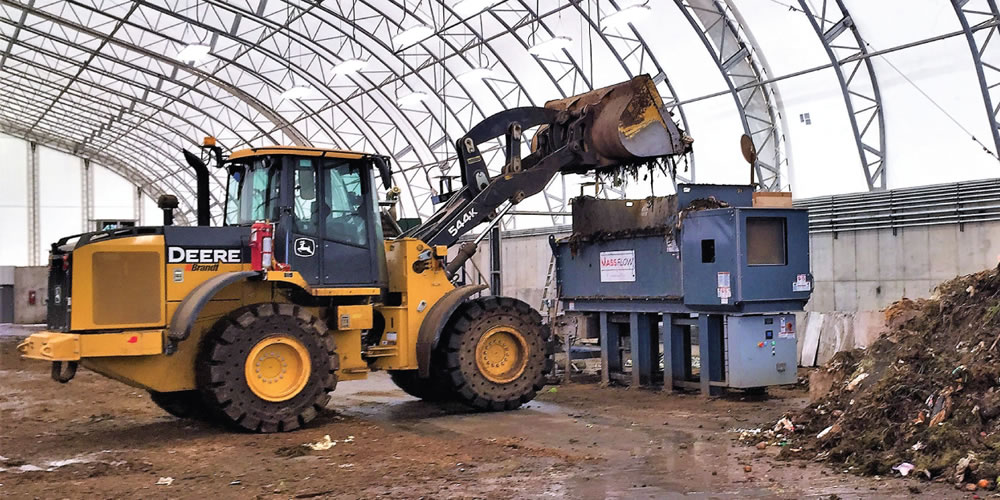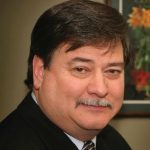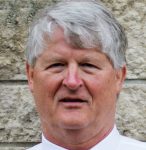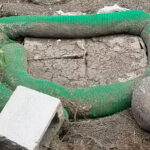People and initiatives to recognize for what they have contributed to advancing composting, compost utilization and anaerobic digestion in Canada.
Susan Antler, Compost Council of Canada
BioCycle July 2019
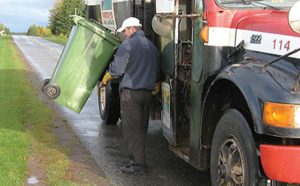 Prince Edward Island: East Prince County
Prince Edward Island: East Prince County
It will be 25 years this year that PEI implemented the Waste Watch program in its Prince County for the collection of source separation organics (SSO) at curbside. When the Waste Watch Program first started, the approval rating for the initiative was very low. One year later, the approval rating was over 90%. Curbside collection of SSO was a milestone initiative that eventually led to an Island-wide expansion of the mandatory program. And it was the “proof in the pudding” that allowed the Compost Council of Canada (CCC) to showcase it to all municipalities of that size (and beyond) who said it couldn’t be done.
City of Kelowna: Kelowna’s OgoGrow Compost
The City of Kelowna’s composting facility manufactures OgoGrow Compost, created from biosolids, hog fuel and wood ash. Located in the interior of British Columbia, the facility is among the 20+ year club — something that is much more standard now but at the time was “revolutionary.” The program began in 1995 and moved to it’s current site in 2006. Video link
London, Ontario: A&L Canada Laboratories
Many years ago, I was calling around to figure out the issue about incorporating agronomics into our compost tests and directing consideration for proper end-use of the compost based on the agronomics of the product produced. After about 50 phone calls across the country, I got to Greg Patterson at A&L Canada Laboratories who “got it” and worked with the CCC to develop our Compost Quality Alliance program. A&L is a great leader in lab testing, contributing much on a volunteer basis to our industry.
Government of Manitoba: Jim Ferguson
When working at Green Manitoba, Jim Ferguson developed an overall strategy to advance organics recycling across the province, incorporating both programs and funding support. His stewardship enabled infrastructure of all types to be developed and diversion rates to skyrocket.
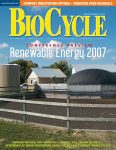 Cobden, Ontario: Fepro Farms
Cobden, Ontario: Fepro Farms
In January 1990, two brothers, Paul and Fritz Klaesi, moved their families from Switzerland to Canada to settle on Fepro Farms, a dairy operation in Cobden, north of Ottawa, Ontario. In 2003, the brothers retrofitted their existing circular manure pit to install a continuous flow, complete mix digester, making them the first (or among the first) in Canada to adopt AD to manage manure and generate electricity.
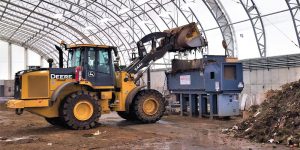 Province of Nova Scotia: Organics Ban
Province of Nova Scotia: Organics Ban
Nova Scotia’s ban on organics from landfill in 1996 helped develop collection and processing infrastructure throughout the province. Its continued support, assisted with funding from DivertNS, has helped greatly to advance both public and private organics recycling throughout Nova Scotia.
ORBIS Corporation: Art McKenzie
Art McKenzie of ORBIS (formerly Norseman Plastics) has been a huge advocate/proponent of backyard composting in both Canada and United States. Starting with the Earth Machine, the company also expanded into curbside collection carts as well as rain barrels. Art has been with ORBIS/Norseman Plastics for 26 years — and has been a huge contributor.
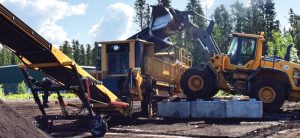 Yukon: City of Whitehorse
Yukon: City of Whitehorse
The City of Whitehorse’s composting facility has been in operation since 2008, producing quality product and defying beliefs that composting north of 60° is difficult or even impossible. The citizens of Whitehorse are encouraged to do backyard composting but are also provided with a curbside collection system for their yard and household organics. The centralized windrow composting operation welcomes the organics while its fencing discourages wildlife visitors.
Procter & Gamble Canada: Don Cook, Dennis Darby, John Bartlett, Glenn Parker and Mitch Banks
Procter & Gamble Canada provided amazing seed money in the early 1990s to advance research and discussions in both the U.S. and Canada — including creation of both the US Composting Council and the Compost Council of Canada, the training program that both our councils use, and the TMECC (Test Methods for Examination of Composting and Compost) protocol that underpins both of our compost quality certifications. P&G has not been members of CCC for several years now, however the company was a huge, huge contributor to everything that has developed since then because of its original investments. Mitch and John are now retired from P&G (Glenn is deceased) but they continue to volunteer for our Council.
Kitchener, Ontario: Schlegel Poultry
Schlegel Poultry acquired several Southern Ontario turkey farms during 2013, including a composting business started by Cold Springs Farm in 1996. After years of purchasing local feed grains in addition to what was grown on their own land to make turkey feed, over time Cold Springs found that applying all the turkey manure produced back on their own land base was resulting in excessive soil nutrient levels. Composting began as the key component of a nutrient management strategy to redistribute manure nutrients to where they would be beneficial. The plan was to create a Turkey Litter Compost (TLC) product with more value than raw manure, free of viable weed seeds, to sell to cash crop farmers who needed the slow release nutrients and stabilized organic matter found in TLC to rebuild their depleted soils. Over the past 20+ years a market for high quality TLC was built, first with tobacco, then ginseng, and more recently with certified organic grain and vegetable growers. Schlegel Poultry Compost continues to be a pioneer in livestock manure composting, transitioning from Cold Springs nutrient diversion focused, cost-of-doing-business model to a revenue-generating business model. The current focus of the business is to continue developing higher value niche markets for our product as we ask our customers to: “Give Your Soil Some TLC”.
SOLINOV: Francoise Forcier
Francoise Forcier, engineer and agronomist, has devoted well over 30 years to advancing organics recycling and the return of organic matter back into the soils of Quebec. She cofounded SOLINOV in 1998 and has made significant contributions to the planning and implementation of organics collection programs and treatment facilities (composting and biomethanisation) within the municipal and private sector while also providing considerable professional accompaniment to composting facilities operation and agronomic services for many end markets. In partnership with the Compost Council of Canada, Francoise serves as the instructor for the Compost Operator Training course in French Canada. Over the past 10 years, SOLINOV designed and assisted the implementation and operation of eight composting facilities (new and expanding), under Francoise’s direction, to help achieve ambitious organics recycling objectives of the Quebec government.
Vancouver, British Columbia: City Farmer
For the past 40 years, City Farmer has encouraged urban dwellers to pull up a patch of lawn and grow food in the city, compost their waste and take care of their home landscape in an environmentally responsible way. In 1994, City Farmer launched the first website on the Internet — Urban Agriculture Notes — to publish information about urban farming. Michael Levenston, Executive Director, has been a huge advocate and proponent of urban agriculture for decades.
Atlantic Canada: Envirem Organics
Established in 2010, Envirem Organics has become one of the largest organics recycling and compost manufacturing enterprises in Canada, building partnerships with both resource-based companies in forestry and agriculture as well as municipalities. Envirem, led by President and General Manager Bob Kiely, has invested significantly in research — federally, regionally and provincially — creating applications and products for specific markets, both in bag and bulk.
Alberta: Allan Yee and City of Edmonton
Allan Yee has been a stalwart champion of organics recycling for nearly three decades, contributing to the development and implementation of composting and anaerobic digestion programs for the City of Edmonton. He is considered a leading expert in the intricacies of assessing and obtaining carbon credits from organics recycling initiatives. Now retired, Allan helped the City earn incremental revenue from its sale of carbon credits related to organics processing.
Region of Peel: Larry Conrad
While at the Regional Municipality of Peel, Larry Conrad spearheaded development of the Agricultural Compost Trials in Ontario, coordinating provincial research and arranging for the use of 300,000 metric tons of compost in farm fields over four years. He assessed the results from a variety of perspectives including productivity, logistics and economics. Since then, this research has been extended to digestate, helping to build ever greater awareness and use among the farm community.
Research & Development Institute for the Agri-Environment (IRDA): Denis Potvin
Denis Potvin has been spearheading organics recycling initiatives in Quebec for over 30 35 years, helping to implement and operate composting facilities, establish industry standards and implement market-based research. He has been a champion of organics recycling in both times of environmental interest and those when both government and the private sector had minimal interest in organics recycling. Denis’ passion for compost and its connection with soil health was what fueled his original interest and life choices, helping him to “stay the course” when the externalities of society’s “priorities” were not in our industry’s favor. Denis is currently biomass conversion project manager at the Research & Development Institute for the Agri-Environment (IRDA).
Continue reading


